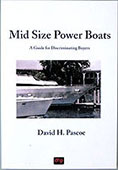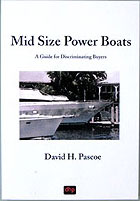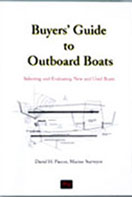Long Distance Boat Shopping
How to Avoid Wasting Time and Travel Expenses
by David Pascoe
It happens as many as two to three times per week. A boat buyer calls me up and says that he’s about to come to Florida to look at a boat on the week end. Could I do the survey the following week, and if so he’ll call me. Nine out of ten times I never hear from him again.
As everyone who has ever done it knows, boat shopping is not easy. Yet it never ceases to amaze me how far people will travel to look at a boat, often a thousand miles or more even for a small one. Unfortunately, all too often they travel those long distances only to be sorely disappointed that the boat was not in the condition that it was represented to be. That surprises them, but it shouldn’t.
Here are some tips to help you avoid wasting your time.
First, and most important, don’t forget that you are dealing with a seller, be it a broker or owner. Not only do they have a vested interest, but their views and opinions about what constitutes "good condition" may be different than yours. Their normal inclination is to paint a rosy picture.
It is irrational to ask a seller a broad question about condition and expect to get an accurate answer. "Yeah, my boat is a real piece of trash, but you should come look at it anyway." How could you expect any seller to give an honest answer like that? Or even "It has pretty heavy wear and tear." No, ninety-nine out of one hundred sellers will fudge – big time.
Knowing that, you either have to devise a strategy to gain more accurate information, or simply never travel long distances on a crap shoot. Yet many buyers do take that crap shoot for the very same reasons people on fixed incomes tend to fall for scams of all sorts: It’s the hope that they can get something really good for a lot less. In other words, they believe that free lunches are possible.
Going bargain hunting is all well and good, but I can tell you the reason that I never hear from these guys again is that what motivated them to drive or fly a thousand miles was a price well below average market; they were hoping against hope that the boat would be that one-in-a-million good deals. Of course, it never is, so save yourself the trouble of trying to prove the impossible. The only free lunches are paid for by those who plan to pick your pocket. Hopefully you are not still making lists for Santa Claus or waiting on the tooth fairy.
Meanwhile, if you plan to travel a long distance for a boat that isn’t priced below market – you still have to ask yourself why are you doing that? Is that boat the closest one you can get your hands on? If you’re not expecting miracles, you still need to do more than just hop a plane or stay up all night driving.
I suggest learning a few skills that all police detectives, cops and intelligence agents have: the ability to interrogate a person in such a way as to get them to reveal that which they do not intend to reveal. This doesn’t necessarily mean tell the truth, but to reveal it between the lines. This can be done without insulting him or his boat by asking questions about specific issues. Think about it; if you ask, "What is the condition of the boat?" you’re going get a very general answer with a lot of sugar coating. He may say, above average, and in some aspects it may well be. But he’s certainly not going to give a negative answer about the whole boat.
But, if you ask questions like the following,
- What is condition of gel coat? Any shine left?
- When was last time the boat was waxed?
- How old are the batteries?
- What is condition of canvass?
- What is condition of upholstery?
- What was last engine work done? And before that?
- What is condition of paint on aluminum window frames?
Get the idea? He’s not going to tell you that the whole boat is run down, but answering a fairly large number of questions he’s far more likely to give honest answers to specific questions of condition that don’t involve the entire boat. In other words, the seller will be more willing to reveal small negatives than large ones. Why? Because none of these things taken alone are likely to sink a sale. He won’t feel very threatened by admitting that the batteries are old and the gel coat has long lost its shine. Moreover, by the time he’s given too many negative answers (assuming that he does) it will be too late and he’ll suddenly realize that he went too far and probably starts to clam up.
Before talking with the seller on the phone. Prepare a written list of questions and be prepared to write down the answers to each.
It is very important to be entirely casual and as offhand as you can, for if the seller perceives that he’s under a planned interrogation, you loose the game. He’ll stiffen up and guard his answers. Remember Colombo? Believe me, Colombo the bumbling detective was no mere TV creation: Lots of dumb cops solve lots of crimes by acting stupid. People are naturally less guarded with the unthreatening. Fortunately, you have the advantage since he’s eager to sell his boat, so he’s unlikely to try to rush you off the phone. Take advantage of this to get the most from this opportunity.
Of Course a real Colombo knows in advance every question he’s going to ask. In reality that methodology is extremely effective and you can use it too. That means don’t shoot through a list of questions one after another like a machine gun going through a belt of ammo; that reveals your method only too clearly. Spread your questions out in general conversation. Like Colombo walking out the door after he’s finished questioning the subject, only to knock again a few minutes later, "You know Mr. Jones, my wife says I’m a forgetful person. I think maybe she’s right because I just forgot to ask you about . . . . . "
The primary reason why brokers prefer to keep the seller away from the buyer is the fear that the seller will say something that kills the deal. And that is true . . . . given enough time and conversation, the seller probably will reveal many things that the broker would not want him too. But it takes time so that the more time you spend with the seller, the more you’ll learn. Keep the conversation casual and friendly, space your questions out, and listen to the seller carefully. He’ll tell you a lot between the lines. If you're on the phone with him, keep him on the line for as long as you can without being obvious.
Finally, as a last effort you might stress to a seller that you perceive has given only guarded answers, "You know Mr. Jones, I’m going to be spending a lot of time and money traveling all this distance to see your boat. If it’s not what you say it is, I’m not going to buy it. This will waste your time and mine. Is there anything about the boat that I should know that you haven’t already told me? You might as well tell me now."
You ask this question only at the very end of the conversation because it is intimidating, but at this point you’ve nothing at all to lose. Except a long trip in vain.
* * * * * * *
There are several other strategies one might employ in the event of the prospect of traveling very long distances. That is to employ someone to have a preliminary look at the boat on your behalf. The obvious choice would be a marine surveyor, but most surveyors would only be willing to do this for a reasonable fee if the boat is located fairly close by to them. I typically charge $150-$250 to travel up to about 30 miles; how long it takes to travel to the boat is going to be a major factor whenever a flat rate is involved.
One might also consider using a yacht broker. Brokers may be willing to do this for you if you will let them represent you on the sale. The motivation, of course, is that they get to split the commission with the selling broker if you buy. Personally I would not hesitate to do this so long as I could find a broker who comes highly recommended. There is much to be gained from a broker-to-broker deal since the listing broker only represents the seller, never the buyer.
Posted June 18, 2002

















David Pascoe is a second generation marine surveyor in his family who began his surveying career at age 16 as an apprentice in 1965 as the era of wooden boats was drawing to a close.
Certified by the National Association of Marine Surveyors in 1972, he has conducted over 5,000 pre purchase surveys in addition to having conducted hundreds of boating accident investigations, including fires, sinkings, hull failures and machinery failure analysis.
Over forty years of knowledge and experience are brought to bear in following books. David Pascoe is the author of:
In addition to readers in the United States, boaters and boat industry professionals worldwide from nearly 80 countries have purchased David Pascoe's books, since introduction of his first book in 2001.
In 2012, David Pascoe has retired from marine surveying business at age 65.
On November 23rd, 2018, David Pascoe has passed away at age 71.
Biography - Long version